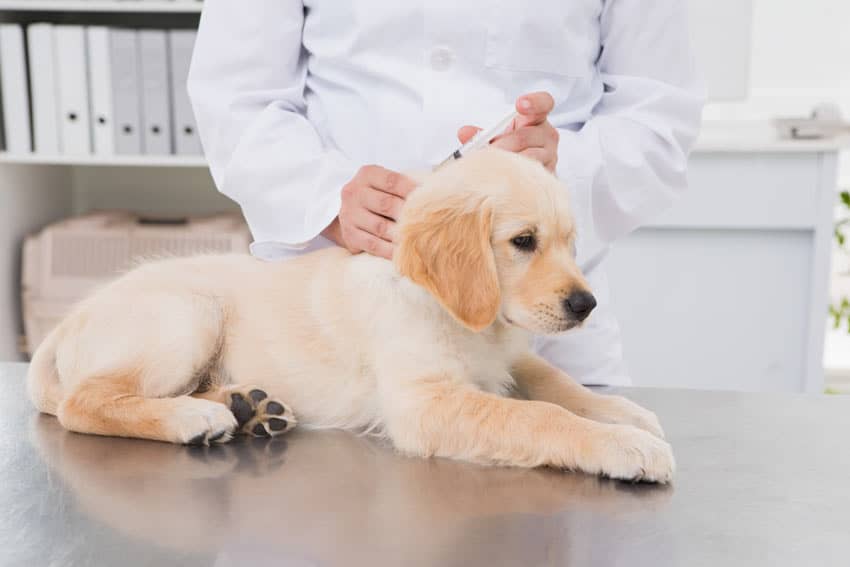At the time of purchasing a Lab puppy, its easy to get confused with so many parameters affecting the decision. Spotting the right puppy for your home takes time and experience. When you go out, you cannot simply get one by paying the money.
There are factors like breeding, legal and health to consider. It’s better to be aware of these parameters than being sorry later. The decision you take about the puppy will be there with you for years to come. If you follow a methodological process as outlined in this article, you would be good to go.
How to Identify a Good Labrador Puppy? 1) Is Labrador the Right Dog for Me. 2) Finding a Reliable Breeder Will Save You on Medicines, Food, and Training. 3) Puppies gain skills from biological parents via genes, check the parents. 4) Make an informed decision. These steps can guarantee that you won’t get the wrong puppy which doesn’t meet your needs.
When you want to spend money on anything, you want fair value in that transaction. Thus when you are going to purchase a Lab puppy, it is so important to gather some information first. Just by looking at the puppy, you can never be right.
There are some questions that need to be asked and when you get the right answers to them with regard to the puppy, you can easily decide if you want to get him or look for another one.
Is Labrador the Right Dog for Me
Labradors are one of the most popular dog breeds today. They are known for their affable personalities, their goofy characters and their fearless and sometimes protective temperaments which make them good for both family and work situations.
Originally bred to be working dogs in the humid, cold climates of Canada, where the Labrador’s forbears spent a great part of their lives in the water, helping fishermen and hunters to round up and retrieve quarry.
Even in modern days, the Labrador boasts the thick, sometimes wiry coat that helped its ancestors to stay warm when fowling in the freezing Canadian sea. Due to this selective breeding, the Labrador breed still retains many of the characteristics that made the dog a valuable asset: vigor, strength and powerful love for retrieval. Labradors come in three main variants: chocolate, yellow and black.
Though there are many differing opinions on the defining characteristics and traits of each type of Labrador, the chocolate lab is seen as a bit of a lush with an affinity for the show ring.
The yellow lab is famously the first choice as a guide dog for the blind, and the black lab frequents television and movies as an astute hunter and birding dog.
There are many things to consider prior to making the leap into Labrador ownership, however; as with any new pet, the responsibilities associated with owning a vivacious dog like a lab cannot be understated.
1) Are Your Family Members Agreeing to Him Joining Your Family?
Labrador retrievers are excellent companions for many living situations, including both single owners and large families with children. However, it should always be a decision that involves every member of the family; agreeing to adopt a Labrador is no small undertaking.
These dogs are intelligent, high-energy and can be therefore difficult to train. Is the entire family on board with the challenges that come with a puppy?
Children should be given equal consideration\; although Labradors make excellent companions for young kids, their rambunctious nature and large size can deter some children.
The issue of any other family pets that will be affected should also be given as much importance as kids. Though the Labrador is known to be sociable around other animals, every individual dog is unique, especially when “prey” animals are involved (cats, rodents, birds and even smaller dogs).
Therefore proper socialization is absolutely necessary when bringing a new dog home, and should be researched and undertaken properly to avoid any unneeded bumps along the road. If there is a suspicion that there may be undue prey-seeking behavior or that another pet may be endangered, the correct actions must be taken to prevent this, even if it means re-homing a pet or reconsidering your new puppy.

2) Consider Your Home and Space It Has for Labrador puppy?
Puppies are well known for their boundless energy and playful spirits, but Labradors are another thing altogether. Through many years of selective breeding, the Labrador has become well known as one of the most energetic dog breeds available, and the puppies are no different.
One of the most important things to consider when adding a canine member to the family, regardless of its breed, is the space available for a young dog to roam and exercise.
Labradors are considered a bad fit for apartments due to their energy levels and occasional fondness for chewing when bored, however, even if your family does not have a few acres for your new family member to run, as long as your puppy will receive exercise in some form or another any situation can accommodate a Labrador.
Another important characteristic of the Labrador to take note of is their sense of wanderlust; they are known to be trusting of strangers and curious of new smells, and therefore wandering off can be a real danger.
Fences are an excellent way to discourage this type of behavior, although in absence of this a watchful owner, adequate training and a long leash can suffice to prevent escape.
3) Does Your Financial Condition Allow for Owning Labrador?
Any new pet can be expensive, but Labradors can be prone to many extra expenses that should be taken into consideration before taking the plunge on a purchase.
Apart from the normal costs of new dog ownership, including microchipping, vaccinations, collars, leashes, food and boarding where necessary, Labradors also demand an extra level of expenditure to make sure they live long, healthy and happy lives.
Any dog that can be classified as “medium” or “large,” for example, requires gear and food that are made for this size animal, and the price tag on these can be greater than that which would be required for a small dog. Veterinary bills can also be steep, venturing into the thousands sometimes for various ailments.
It is important to ask the breeder from which you plan to purchase your new Labrador retriever what sorts of medical issues have arisen previously in that particular line, what can be done to prevent their exacerbation, and how best to identify the symptoms to best head the conditions off.
Finding a Reliable Breeder Will Save You on Medicines, Food, and Training
Finding a reputable breeder with experience in the Labrador retriever breed will make the transition from the dam to home much easier and more comfortable for both dog and owner.
Gleaning information from the breeder can help to lessen the cost for things like training and veterinary treatments down the line. A breeder should always be the front line defense for any preventable or hereditary issue.
They can also be an invaluable resource on the subjects of food and training; most breeders have experience in both providing adequate nutrition for their dogs to maintain health and longevity and also how to properly train based on requirements and characteristics unique to the breed.
Taking tips and suggestions from a breeder can save time and money on professional training programs and less healthy commercially available food.

Questions to Ask Your Shortlisted Breeder
The most difficult task involved in choosing where your Labrador will come from is selecting a breeder. There are scores of breeders who are active in most countries in North America and elsewhere, and a quick web search or a visit to a breed-specific website is a great place to begin.
As with any business, all breeders are not created equal; therefore it is important to take some time and investigate each one before choosing the best fit.
Some breeders do not recognize hygienic or safe environments for their litters, and many will falsify information in order to prey on the uninformed or inexperienced.
Often a visit to the facility or home of the breeder is a good way to differentiate between the predatory or dishonest breeders from those who are honest, forthcoming and diligent regarding the health and quality of their lines.
Once a breeder is chosen, there are several questions that can be asked to ensure that you go home with a puppy who is healthy, happy and bound for success:
Will the parents get registered? What rights will I own on the puppy?
If a breeder is reputable and breeding Labradors for confirmation or agility as well as pets, most, if not all, the dogs that the breeder owns, including dams and sires, will be registered with the AKC or one of its constituent.
This provides information on specific bloodlines and guarantees that your new dog is indeed a purebred Labrador. The paperwork on such animals should be readily available for inspection and verification prior to purchasing a pup.
In addition to this, making sure that you know what sorts of rights on your pup you’ll be buying is very important too. Many breeders will try to retain breeding rights or a certain number of litters, or demand that you refrain from spaying or neutering if your Labrador will be a pet only.
If this is a source of discomfort, the best time to say so is prior to purchasing when arrangements can still be made.
What kind of socialization and environment puppy get during his breeding time?
Labradors are social animals, and their socialization should start young; much like human children, their earliest environmental and social exposure will go a long way toward determining what kind of dog he or she will grow into someday soon.
Although it can be very telling to simply observe the breeding location, asking the breeder directly to expound upon the kinds of activities and socialization that are implemented to produce a quality dog doesn’t hurt.
Another good indicator is the behavior of the adult dogs in the facility. Are they skittish or nippy? Do they seem frightened of interaction both from dogs and humans alike? This can be indicative of a bad breeding situation without proper socialization, and can deeply affect a pup’s growth and development. When in doubt, always trust your instinct!
Can you get the vaccinations chart which shall be given to the puppy?
Puppies get their first vaccinations around the age of four to six weeks and will receive frequent boosters and shots until they leave their mothers at the age of twelve to fourteen weeks.
Therefore in most cases, when a puppy is purchased from a breeder, many of the necessary shots have already been administered. However, it is important to note any continuing needs for further vaccinations and booster until your dog is old enough to go a year or two between necessary shots.
A reputable breeder will provide you with a chart or a list of the prior vaccines, what type of prevention and when the next ones are needed in an easy to read format. Keeping your dog healthy does not end in adulthood, but it certainly begins before then.
If no vaccinations have been administered or notated, this can be a red flag. Distemper, parvo, and rabies are deadly to Labradors and easily contracted, though very preventable.

What all other breeds are handled by the breeder?
Not all professional breeders specialize in a single breed of dog. Many experienced breeders will have experience in many different types, which seems to be a natural result of gaining experience in the field and branching out.
If the number of breeds currently being kept in a single facility is too high, or if there are too many different types of dogs, this can bode ill.
There’s nothing wrong with being a jack of all trades, but sometimes spreading a breeder too thin can result in issues with purity and health problems amongst puppies.
What is the experience of the breeder in breeding Labs? Any major cases or complaints?
Like any good business owner, a breeder’s job is to talk up his or her product, and in this case, the product is a good, healthy Labrador. While many breeders have been at the game for long enough to be able to differentiate between the traits of a good dog and one who will run into issues later in life, some breeders are still wetting their feet in the art of breeding dogs.
Labradors in particular, due to their popularity, seem to be an easy target in the creation of puppy mills, or facilities who breed dogs only for the financial gain that it entails.
Moreover, careless breeding between two-parent dogs with serious health issues can perpetuate those problems into later generations, causing a much bigger issue with dogs who continue to fall ill to the same problems.
Therefore it is important to gain as much knowledge as possible regarding the breeder’s history and how the lineage appears so far. The AKC can be a valuable resource in the selection process, due to its exquisite record-taking track record and capacity for suggestions and comments.
Will you provide the initial instructions on how to handle the puppy and his pet supplies for the initial days?
When purchasing a Labrador puppy, the prospect can seem overwhelming. There are so many specifics and rules to owning a young dog, including which supplies you will need, how initial training will go and what to expect from your new family member in the first few days.
A good breeder will be happy to explain what to look for, how to react to your new puppy’s behavior and what constitutes normal activities.
Therefore it is a good idea to ensure that your breeder outlines these things for you wherever possible and provides detailed explanations, especially if it has been some time since you’ve been in close quarters with a young, curious, potentially frightened dog.
Tips for keeping your new Labrador puppy happy and comfortable while adjusting to his or her new digs is key to starting a new life together as smoothly as possible.

Ask for testimonials and references for getting feedback from previous buyers?
When we want to try out a new restaurant, where do we go first? Yelp, of course, or a similar place where we can see firsthand experiences and reviews. In this way, it’s easy to see if the restaurant is all it’s cracked up to be before we waste our hard-earned money on something we may be dissatisfied with.
Purchasing a puppy from a Labrador breeder should be no different, and for this reason, it’s a good idea to ask the breeder if there are any prior customers or puppy owners that you can contact to see how their buying experience was with their own puppies.
Again, a breeder is a business owner, so this should be a no-brainer for them; the better the service, product and plan of care, the happier his or her customers will be, making them not only likely to purchase again but also to rave about the quality of the services they received.
Many breeders keep details on every puppy sold, so this should not be an issue unless the breeder has a great deal of negative feedback to hide.
Is there any refund in case of fraud or insurance of any kind for the purchase?
Not many breeders offer insurance, but there can be some peace of mind for new puppy owners in the form of a contract between the buyer and supplier detailing the course of action that will be taken by both parties if things just don’t work out.
The puppy may not get along with the family cat, perhaps, or maybe a startling health problem manifests itself, such as seizures or signs of distemper.
This also gives the buyer some peace of mind if there is suspicion of fraud occurring during the transaction, such as a promise of delivering the puppy personally once the payment is rendered, or raising the price abruptly.
Documentation with witnesses can help alleviate the concerns of both parties and keep the transaction simple and to the point, therefore beneficial for everyone, including the puppy.
Any special processing or agreement for the new owners who adopt the puppy?
Again, many breeders will sell their puppies with a litany of stipulations circling around which benefits and rights cease and which persist after the puppy is purchased and taken away from the facility.
Many times this has to do with breeding rights, be it a litter with the first pick of a puppy or a siring of their choosing later on.
Documenting these quid pro quos is very much advisable even if the agreements seem fairly simple and straightforward, and witnesses to such an agreement can also help to keep everyone honest.
Puppies gain skills from biological parents via genes, check the parents
With any puppy, one of the most important things to do before taking your friend’s home is meeting and spending time with both the parents of the litter.
Labradors are prone to hereditary issues just like any dog, but these don’t always extend to genetic illnesses. Sometimes the temperament and physical skills are also passed down to the progeny.
This is especially important if there are plans to use your Labrador in confirmation or agility, as both these sports require a great deal of talent; most of this talent will come from hard work and training, but not all of it.
If the personalities or temperament of either parent strikes you as unbecoming, it may be a good idea to walk away and find another breeder. Remember that the apple doesn’t fall far from the tree, even in dogs!

How to make a final decision on which Lab puppy will get a place in your family
Now that you’ve queried the breeder, requested paperwork and DNA records, met the mother and father and gleaned all you need to know on how the new Labrador will work out in your home, it’s time for the most exciting part of all: picking your puppy!
There are many criteria to remember when choosing your new friend; would you like a black lab? A yellow lab? Perhaps a chocolate lab? Are you looking for a companion or a sporting dog? Would a high-energy animal fit better into your household than a calm one? The best way to see if the fit is right is to bring the family to the ceremony of choosing your Labrador.
Meeting each individual puppy can be useful in gauging how their personality seems to be, but just as important is observing how the pup behaves among his or her siblings. Does he or she seem like the most dominant personality there, jumping on the other puppies and causing a ruckus? Or is he or she more reserved, sticking to the outskirts of the commotion and seeming much more interested in the humans? An affinity for cuddles, or a more aloof puppy?
There are many options to consider, but in more situations than not, your puppy will choose you. When the connection between man and dog is there, it’s difficult to ignore. When it’s right, it’s right!
References
- https://www.sciencedirect.com/science/article/pii/S1558787817301570
- https://avmajournals.avma.org/doi/full/10.2460/javma.241.9.1163
Table of Contents